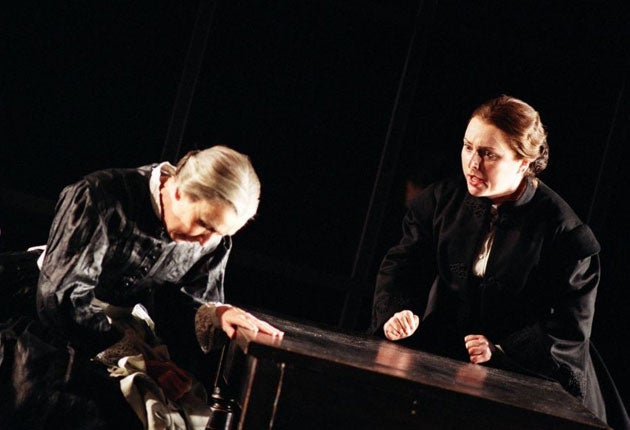The Turn of the Screw, Coliseum, London

Your support helps us to tell the story
From reproductive rights to climate change to Big Tech, The Independent is on the ground when the story is developing. Whether it's investigating the financials of Elon Musk's pro-Trump PAC or producing our latest documentary, 'The A Word', which shines a light on the American women fighting for reproductive rights, we know how important it is to parse out the facts from the messaging.
At such a critical moment in US history, we need reporters on the ground. Your donation allows us to keep sending journalists to speak to both sides of the story.
The Independent is trusted by Americans across the entire political spectrum. And unlike many other quality news outlets, we choose not to lock Americans out of our reporting and analysis with paywalls. We believe quality journalism should be available to everyone, paid for by those who can afford it.
Your support makes all the difference.Britten's tersest, nastiest opera, written for a company of 13 musicians and five singers including two children, receives what must be the production of its lifetime in David McVicar's staging, conceived for the Mariinsky Theatre in 2006. ENO's unmissable revival adds to its X-ray of Victorian repression a cast that couldn't be bettered; and Sir Charles Mackerras creates an interpretation of equal transparency and tension.
The opera, in which a nameless governess strives to "save" a pair of children haunted by the ghosts of a depraved valet and ex-governess who have destroyed their innocence, is full of ambiguities; but McVicar's absolute realism, depth of character and attention to detail leaves few doubts as to the backstory of sexual abuse. He evokes a society in which emotion cannot be acknowledged, and in which nothing of real importance can be spoken aloud; and it is this depth of understanding that provides the ultimate "turn of the screw". Why does the young boy Miles drop dead in the final moments? Here, it seems palpable that it is admitting the truth – speaking aloud the name "Peter Quint" – that delivers the coup de grâce.
The children's demanding roles are central to the opera's success and on opening night, Charlie Manton's ideal Miles and Nazan Fikret's Flora matched the adults turn for turn – Fikret oozing suppressed fury, unable to cry for help under the good-little-girl veneer. The sexual pull between the governess and the young boy, knowing beyond his years, is desperately convincing; and Flora's body language as she listens to Miles singing his "Malo" song shows us the tip of the iceberg of terrible associations that the melody must carry.
Rebecca Evans and Ann Murray, resectively the Governess and Mrs Grose, are a dual lynchpin of great voices, great characters and complete verbal clarity. Evans is heart-rending, lovelorn over her crush on the children's absent guardian and driven to distraction by her understanding of the children's fate.
As the all-too-real ghosts, Michael Colvin is a defiant Peter Quint, his flowery melismas embodying decadence rather than spookiness, while Cheryl Barker as Miss Jessel, the ghost of his discarded lover, is a devastating portrayal of a soul trapped in emotional purgatory, her arms reaching out for him through the dead leaves on her grave.
To 9 November (0871 911 0200)
Join our commenting forum
Join thought-provoking conversations, follow other Independent readers and see their replies
Comments